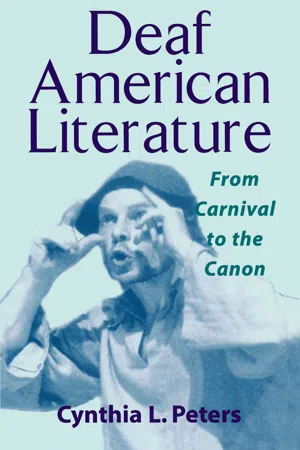
- English
- PDF
- Available on iOS & Android
About this book
"The moment when a society must contend with a powerful language other than its own is a decisive point in its evolution. This moment is occurring now in American society." Cynthia Peters explains precisely how American Sign Language (ASL) literature achieved this moment by tracing its past and predicting its future in Deaf American Literature: From Carnival to the Canon.
Peters connects ASL literature to the literary canon with the archetypal notion of carnival as "the counterculture of the dominated." Throughout history, carnivals have been opportunities for the "low," disenfranchised elements of society to displace their "high" counterparts. Citing the Deaf community's long tradition of "literary nights" and festivals like the Deaf Way, Peters recognizes similar forces at work in the propagation of ASL literature. The agents of this movement, Deaf artists and ASL performers—"Tricksters," as Peters calls them—jump between the two cultures and languages. Through this process, they create a synthesis of English literary content reinterpreted in sign language, which raises the profile of ASL as a distinct art form in itself.
In this trailblazing study, Peters applies her analysis to the craft's landmark works, including Douglas Bullard's novel Islay and Ben Bahan's video-recorded narrative Bird of a Different Feather. Deaf American Literature, the only work of its kind, is its own seminal moment in the emerging discipline of ASL literary criticism.
Frequently asked questions
- Essential is ideal for learners and professionals who enjoy exploring a wide range of subjects. Access the Essential Library with 800,000+ trusted titles and best-sellers across business, personal growth, and the humanities. Includes unlimited reading time and Standard Read Aloud voice.
- Complete: Perfect for advanced learners and researchers needing full, unrestricted access. Unlock 1.4M+ books across hundreds of subjects, including academic and specialized titles. The Complete Plan also includes advanced features like Premium Read Aloud and Research Assistant.
Please note we cannot support devices running on iOS 13 and Android 7 or earlier. Learn more about using the app.
Information

Table of contents
- Cover
- Title page
- Copyright page
- Contents
- Acknowledgments
- Is There Really Such a Thing as Deaf American Literature?
- Carnival: Orature and Deaf American Literature
- Deaf Carnivals as Centers of Culture
- The Oral Tradition: Deaf American Storytellers as Tricksters
- Literary Night: The Restorative Power of Comedic and Grotesque Literature
- Deaf American Theater
- Islay: The Deaf American Novel
- Poetry
- From Orature to Literature: The New Permanence of ASL Literature
- Conclusion
- Index